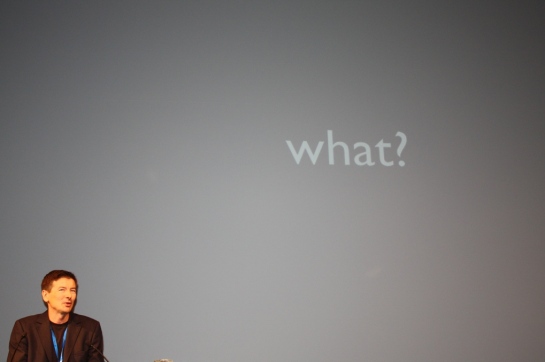Two weeks ago, I had the pleasure of moderating the Special Track on Research 2.0 at i-KNOW 2012. It was now the third year that we had a Research 2.0 themed track at i-KNOW. Counting in the two workshop at the European Conference on Technology Enhanced Learning (EC-TEL) in 2009 and 2010, this was the fifth installment of its kind. For the second time, the special track was collaboration of the STELLAR Network of Excellence and the Marie Curie project TEAM.
In the latest edition, we had a wide papers on a variety of subjects. But the track was not only diverse in terms of topics, but also in terms of geography. The authors and speakers came from Belgium, Canada, the US, the UK, Germany, and Austria. At this point, I would like to thank our excellent program committee. These fine people not only helped us in reviewing the submissions but also spread the word of the event far beyond our own circles. So what happened in the special track?
Session 1
Erik Duval (pictured above) from KU Leuven started the day with an inspiring keynote. He talked about analytics in research, and how we need tools to manage the exponential growth of knowledge in research. He presented several tools developed at KU Leuven, such as TiNYARM (This is Not Yet Another Reference Manager), a social reading application, More!, a mobile conference application, and visualizations of scientific papers for a tabletop. For all the details, check out his presentation on Slideshare.
Next up was Marta Sabou from MODUL University Vienna, who presented a paper on crowdsourcing in (NLP) research. She talked about different crowdsourcing approaches in research along the dimensions of time, genre, and steps in the research process. She then laid out how crowdsourcing has revolutionised NLP research in terms of cost and diversification of the research agenda. She finished with the challenges that arise from this new research methodology. More can be found in her presentation on Slideshare.
In the following talk, Aida Gandara from the Cyber-Share Center of the University of Texas at El Paso presented an infrastructure that supports researchers in documenting and sharing scientific research on the semantic web. The infrastructure follows a methodology that emphasizes the need for documentation during the whole research process, not only when a research cycle has ended. The infrastructure is currently used by a number of teams which collaboratively document their research in it.
Session 2
After the lunch break, Daniel Bahls continued on the notion of the semantic web. Their paper, however, focuses on the field of economics. He discussed an approach for representing statistical data from empirical research in a semantic form. Afterwards, he showed prototypes that build on this approach, and allow for recommendation in user assistance in evaluating datasets. He concluded with the outlook that open data is a prerequisite for open science, but that it also needs methodological information in order to reproduce research results.
Orland Hoeber returned to the topic of analytics in the following talk. He presented a system for scholarly search which is enhanced by metadata visualization. Among these visualizations are a histogram of the most frequent keywords in the search results, as well as a bow tie representation of citation metadata. The latter is an innovatve way of conveying citation patterns to users. The focus is on integrating the visualizations in the search and exploration process as seamless as possible. For all details, see the paper.
The second session was concluded by two practical demos. First off, Christian Voigt from the Centre for Social Innovation and Adam Cooper from the University of Bolton introduced a roadmapping methodology for Technology Enhanced Learning. At first, they talked about sources and frameworks for roadmapping. Then, they presented their approach which is based on text mining of blogs from the field. For more information, see the demo paper. Afterwards, Karl Voit introduced Emacs org-mode which enables researchers to include raw data and data analysis in the research paper. This allows for the reproducibilty of research results. An example can be found in his demo paper.
Session 3
After the coffee break, Hermann Maurer gave an invited talk on one of the first open access journals J.UCS – Journal on Universal Computer Science. J.UCS was established in 1994; today it is in its 18th volume, attracting 700,000 article downloads per year. The journal builds on a Hyperwave server which enables several unique features such as automatic detection of incoming citations, and a refereeing system that includes the whole editorial board. If you want to know more about this system and its history, take a look at Hermann Maurer’s presentation.
In the general discussion, open access was one of the main topics. It was debated how the process of opening up research could be facilitated, concerning both technical and social issues. One of the conclusions was that open access is a necessary step, but that it can only be the beginning of what we call Research 2.0.
In my opinion, the special track gave a good insight on what is possible when science opens up and embraces the possibilities of the web. I would like to thank all authors, reviewers, and participants, as well as my co-organizers Roman Kern (Know-Center) and Kris Jack (Mendeley) for making this event possible. See you online and at the next Research 2.0 event!

